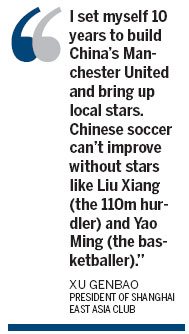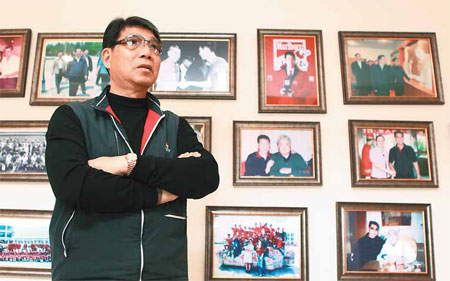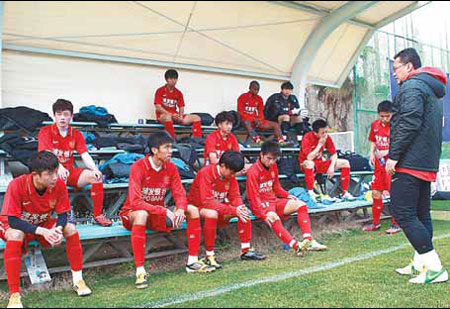Soccer's fantasy island
Updated: 2013-03-03 07:39
By Tang Zhe(China Daily)
|
|||||||
|
Xu Genbao, president of Shanghai East Asia and head of the program's coaching staff, has set his sights on building China's version of great European club Manchester United. Cui Meng / China Daily |
|
A coaching staff member provides guidance to players of Shanghai East Asia at halftime of a friendly against Dalian Aerbin at the Genbao Football Base on Feb 22. Cui Memg / China Daily |

After a dozen years of toil, Xu Genbao's dream of a nursery for soccer players is bearing fruit as his young team, Shanghai East Asia, is set to make its debut in the CSL, Tang Zhe reports from Shanghai.
An old turtle carries dozens of little turtles on his back, his eyes looking in the direction of Shanghai.
"One day they will grow up, crawl by themselves and go out to create their own future," Xu Genbao, comparing himself to the old turtle, said of the sculpture inside his soccer base on Chongming Island, Shanghai, which is located on the Yangtze River and is more than 80 km away from downtown Shanghai.
Xu spent more than 20 years on the sidelines of Chinese soccer field and managed Dalian Wanda and Shanghai Shenhua to first-flight championships.
When he decided to start his own soccer base in 2000, he refused all offers outside of Shanghai. He led second-tier team Shanghai Zhongyuan to the league title and promotion in 2001 and joined Shanghai Shenhua again in 2002.
When his second stint at Shenhua came to a frustrating end after only 10 rounds, Xu, at the age of 58, stepped away from the intense spotlight of Chinese soccer and devoted himself to his academy on the isolated island, vowing to build China's "Manchester United" and develop Chinese soccer stars within a decade.
"I set myself 10 years to build our own Manchester United and bring up local stars. Chinese soccer can't improve without stars like Liu Xiang (the 110m hurdler) and Yao Ming (the basketballer)," the former China leftback said.
Xu expected to invest 8 million yuan ($1.3 million) to start the Genbao Football Base in 2000. However, the budget blew out to 32 million yuan when the final plan was drawn up. It included 3 1/2 pitches and an in-door stadium with artificial grass imported from Germany.
Xu borrowed more than 20 million yuan from a bank. Despite having to pay more than 1 million in interest each year, the 69-year-old has never regretted risking his life's savings.
"I was shocked by my boldness after I made the decision, but once I started, I was going all out," he said. "Our philosophy is to train the players from childhood.
"The soccer base provides the foundation, and producing talented kids is at the core of our pursuit."
To select the first batch of children, Xu organized an invitational competition among primary schools in Shanghai.
"The professional league was in a period of prosperity in 2000, and the soccer environment was better at that time. There were many parents willing to let their children play soccer," said Xu, who selected the first group of 97 children, aged between 10 and 11, from thousands of participants in the competition.
However, that proved to be just the start of a bumpy decade.
"Our biggest problem was we didn't get any financial support from companies, so we had to raise money ourselves," Xu said. "We could never plan for the next year.
"We had to subsidize one child for 20,000 yuan a year at the start," he said. "But I don't care how much money you pay, it's all about the talent."
Most income was originally derived from a 3-story hotel built inside the base at which tourists from Shanghai and nearby cities liked to spend weekends. Xu then started to sell tickets for tours of the base and soccer balls with his signature on them.
After his pupils began to perform well in youth tournaments, Xu inked a deal with the Shanghai East Asia Group in 2005 and announced the establishment of the Shanghai East Asia Football Club, which started its participation in the nation's third-tier league in 2006.
The young lineup moved up to the second division in 2007, won the National Games championship in 2009, and secured promotion to the top flight three rounds before season's end in 2012. The squad, eyeing a top-six finish in the Super League in its first season and a league title in three years, will make its debut against Beijing Guo'an at the Beijing Workers' Stadium on March 8.
The club has also seen eight of its players transferred to other Super League sides, including Guangzhou Evergrande and national team defender Zhang Linpeng and Shanghai Shenhua's former Under-19 international Cao Yunding.
Striker Wu Lei is currently the most sought-after player on the roster. According to Xu, the 21-year-old has not only drawn interest from domestic teams Evergrande and Guangzhou R&F, but also clubs from Norway and Denmark.
"It took Manchester United more than 100 years to become a great club. After seeing what we have achieved over the past 12 years, I believe we are having early success in our bid to build China's Manchester United," Xu said.
"Eight players have transferred to other clubs. I wanted some of them to be in a new environment. Also, we faced financial difficulties in the past and we need money to bring up the coming generations," he said.
Apart from the first team, Xu has four reserve sides, which include more than 100 young players staying at the base.
"The key to our success has been to start with youngsters, set clear targets and focus on polishing skills. But the most important thing is perseverance. It has not been easy to stick to the task here for 12 years, and that's why people say our model is almost impossible to copy," Xu said.
(China Daily 03/03/2013 page8)

